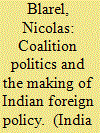| Srl | Item |
| 1 |
ID:
170901


|
|
|
|
|
| Summary/Abstract |
Do Indian regional parties influence foreign policy and under which conditions? Some foreign policy studies have shown that certain coalition-building configurations have facilitated the inclusion of the concerns of small parties in the foreign policy debate. Other works have looked at the role of decentralization and federal power-arrangement in providing more control to political sub-units over the external affairs of a state. Those separate scholarships provide interesting insights to account for the multi-level nature of coalition-building in a federal and pluralistic polity like India. Bridging these two literatures, I argue that the interdependence of regional and national coalition building processes (visible in federal settings) create locked-in alliances between national parties and regional parties which affect foreign policymaking. In these contexts, India’s national parties have to, under certain conditions, take into account the preferences of regional parties when designing foreign policies. This article looks at the hypothesized causal mechanisms and expectations through two illustrative case studies of India’s foreign policy.
|
|
|
|
|
|
|
|
|
|
|
|
|
|
|
|
| 2 |
ID:
116441


|
|
|
|
|
| Publication |
2012.
|
| Summary/Abstract |
We propose a theory of political parties in which interest groups and activists are the key actors, and coalitions of groups develop common agendas and screen candidates for party nominations based on loyalty to their agendas. This theoretical stance contrasts with currently dominant theories, which view parties as controlled by election-minded politicians. The difference is normatively important because parties dominated by interest groups and activists are less responsive to voter preferences, even to the point of taking advantage of lapses in voter attention to politics. Our view is consistent with evidence from the formation of national parties in the 1790s, party position change on civil rights and abortion, patterns of polarization in Congress, policy design and nominations for state legislatures, Congress, and the presidency.
|
|
|
|
|
|
|
|
|
|
|
|
|
|
|
|